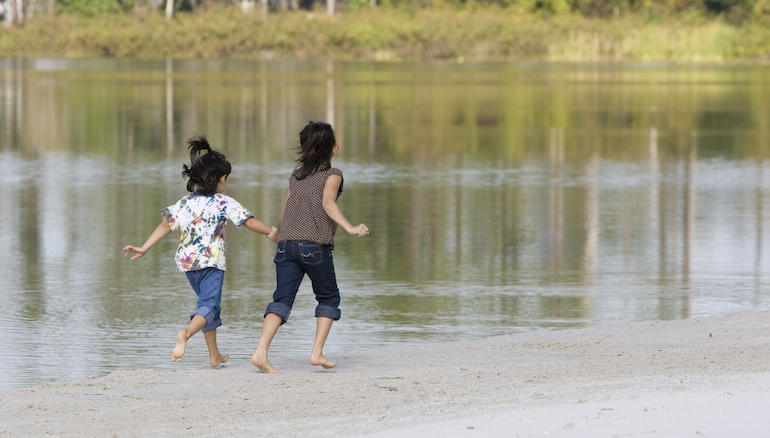Although we knew our biological daughter, Kira, had special needs, we didn’t receive a definitive diagnosis of autism spectrum disorder until after we had come home from China with 10-month-old Ella. When I am asked whether we would have adopted a second child had we known, my answer is an unequivocal yes.
Even as family members quietly implored us to reconsider our adoption plans (“You need all your attention for Kira’s disabilities….”), we knew that we wanted to love and nurture another child.
Two years have passed. Kira is now five, and concerns have proven baseless. Ella is a precocious social butterfly, who adores her sister. Kira, who sometimes must be coaxed to leave the world of her own, laughs readily at the antics of her little sister. Despite the fact that they function at different levels, they are typical sisters in many ways — fighting over turns, stealing each other’s toys, vying for attention.
Luckily, Ella enjoys the constant shuttling to and from speech and occupational therapies that a special-needs sibling requires. She takes Kira’s quirks in stride: her tendency to echo what is said, her repetitive movements, and her love of Elvis Presley, whose music we play every day ad nauseam.
Ella instinctively looks out for Kira, even though, at age three, she doesn’t understand the intricacies of her sister’s needs. When asked her age, Ella often gives her sister’s age instead of her own. I’ve come to realize that she understands intuitively that she is the “big sister.” Not to say that Ella won’t use her sister’s disability to her own advantage. “Sissy wants a juice box, too,” she’ll say charitably. (Later, I’ll catch her scamming Kira out of her drink.) But even Ella’s less-than-generous acts encourage Kira to leave her shell, to stand up for herself to reclaim a favorite book or toy.
Of course, we wonder about the big questions: Was adopting a sibling fair? Once we are gone, will Ella resent being the guardian of a developmentally disabled sibling? We don’t yet know how independent Kira’s life will be.
As any parent of a special-needs child will tell you, raising such a child is challenging, but also deeply rewarding. Kira is a truly joyful child, with a belly laugh as genuine as they come. Ella, simply by her presence, guides and teaches her developmentally disabled sister. I hope that Kira, in turn, will ground Ella. I hope Ella will learn tolerance and empathy for those different from herself.
I know that everything won’t always be easy. Once Ella ventures into the world of school and peer groups, she will become acutely aware of how different her family looks. She will face a double whammy of unwelcome questions about her own race, as well as cruel barbs about her sister’s disabilities. She is going to have to be extra resilient. We’ll help by instilling in both of our daughters the belief that negativity about our differences reflects something wrong with society, not with our family.
My family has taught me not to sugarcoat reality. We’re different. We get stares at the grocery store, sometimes because of Ella’s features and sometimes because of Kira’s tantrums. At the playground, kids size us up. “Are they real sisters?” holds particular resonance for both of my daughters.
Our daughters’ lives may have started in very different places and their experiences will take them in different directions. But when Ella and Kira dance to Elvis, gyrating and giggling together on our kitchen’s black-and-white-tiled floor, I know they are sisters in every sense of the word.



